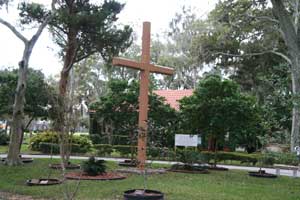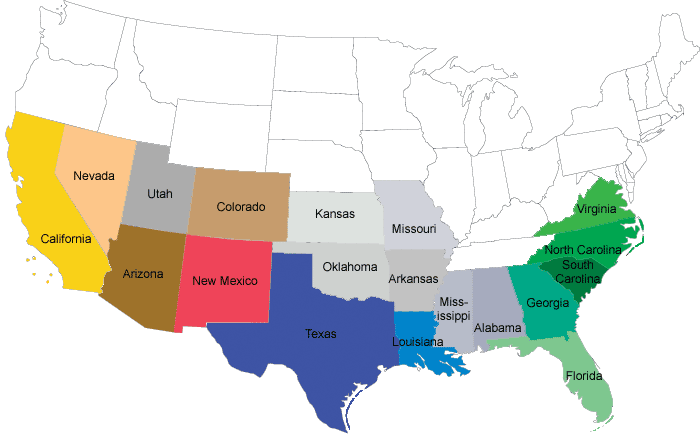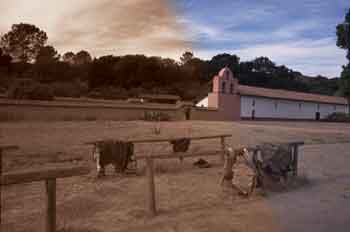

|

|
This web site contains no paid advertising. Donations help.
|
| This is a new web site with some states still under development. Mission Trail Today began as a study of the California Missions and that web site is well developed but in need of updating. When Florida Missions were added in 2008, the idea of U. S. Mission Trail began. Then Missions of Texas, Louisiana, and Arizona were added. In the near future, we hope to add Missions of New Mexico, and more from Arizona and Texas. As we discover mission sites in other states, they too will be included. For now, the California section is functioning, although I plan to add many more photographs and information. I have been to all the main California Missions, most several times and have plans to revisit most. I have slides from several trips that have not yet been scanned. |
This web site is dedicated to the missions and related constructions built by Spain and Mexico* in the 1600s, 1700s and early 1800s and now exist within the borders of the United States. The missions are an important part of the history of the United States South and Southwest and it would be impossible to understand the region's story without understanding the missions story.  Mission Nombre de Dios in Saint Augustine, Florida, first Spanish Mission on modern day U. S. soil. Many cities of the US South and Southwest began with the founding of a mission or their outlying ranchos and sub-missions. Presidios and pueblos were also important and many modern cities grew from these. The missions, presidios, and pueblos formed a triad to extend and protect Spanish development in the New World. * Most of the missions were built by Spain, however, San Francisco Solano was built by Mexico after the Mexican Revolution. |
 This site is owned, designed, and operated by Kenneth A. Larson who has over a quarter century of experience in design and construction of scenery for the Entertainment Industry and Theme Parks using Computer Aided and Traditional approaches to Design. Ken also has experience in other areas of Design. Explanation. |
|
A note: There are no historical photographs on this web site. All of these photographs were taken by myself, and while I may feel two hundred years old, I simply didn't have a camera when the missions were built or when most were restored. These photographs are of the missions as they exist today or within the last quarter century. I include historical text as a summary to give you a quick overview and place the photographs in historical context. There are several good internet sites and books that can provide historic photographs and art work and more in depth histories. I do believe that I have included here more photographs of the way the missions look today and more missions across the entire country than most of the other sites and books. This site can be used as a guide for you and your family to visit the missions which is why I subtitle it Mission Trail Today. So study these pages and the web sites by others and pack up your car and your family and visit the missions. Many of the missions are open to the public, most daily 10:00 am - 5:00 pm. Many are still in use as parish churches and hold Mass regularly. I am behind with scanning my slides but hope to get caught up soon, so stay tuned. I have not yet had time to scan the slides from almost a dozen missions, so check back from time to time. More text and photographs will be added in time. |
Links Contact Sources Donations K. L. Images Mission Trail Today Places Earth |

Colored states had missions, some of which are restored and available to the public. Gray states may have had Spanish visitation or settlement, but I have not yet found a mission site. Hawaii had non-Spanish Missions. |
Arizona California Colorado Florida Georgia Hawaii (not Spanish) Louisiana Nevada New Mexico North Carolina South Carolina Texas Virginia |
Personal ObservationsIt had been my life long dream to visit all of the California missions. Shortly after I began dating my wife, I started taking her to see the missions, including those that I had seen before. There are also two remainig Extension Missions in San Diego County which we saw |
 My collection of Mission Art | |
|
for the first time in late January of 2004. Then I fond more Asistencias and Estancias in California. We have also visited some of the four Presidios in California which were also built by the Spanish and are a part of the mission story. We have now visited missions in Florida, Texas, Louisiana, Arizona, and hope soon to visit missions in New Mexico and Georgia. I'm just behind on processing all the material. | ||
|
About 30,000 years ago, give or take a few millennia, people from northeast Asia traveled across the Bearing Land Bridge into what we now call North America. Within a relatively short time, they had populated all of North and South America and the major off shore islands. They organized themselves into nations and tribes and more or less got along and lived in harmony with the Earth. While not well documented, it seems likely that Europeans had visited the eastern shore of North America prior to the voyage of Christopher Columbus in 1492. It was Columbus' discoveries that brought the Americas to the attention of Europe and it was not long before all the major nations of Europe were setting up colonies in the Americas. Spain claimed the most territory including most of the west coast of both continents and parts of the Caribbean. This included what is now the United States South and Southwest. Spain established missions and settlements throughout its holdings for two primary reasons, first, to bring Christianity to the indigenous people, and second, to help strengthen Spain's claim to the territories also coveted by France, Britain, Russia, the United States, and others. The first mission founded in what is now the United States was in Saint Augustine, Florida. Possibly the most well known missions are in California where all 21 of the main missions have ben restored. Less well known are missions from Virginia south to Florida, and from Louisiana west through Arizona to two almost unknown missions on the California side of the Colorado River. The famous Alamo in San Antonio, Texas is one of dozens of missions built in Texas. Missions and churches were also established in Baja California and a chain of missions eventually extended from the southern tip of South America north into Northern California and Virginia. In California, where most of the later missions were founded, secularization occurred in 1834 when Mexico striped the missions of thier property. Elsewhere, secularization occurred much earlier. In Texas, many missions were secularized and became community churches in the course of normal events as the "mission" moved on to a new location, often with a new name. With the secularization of the California missions in 1834, the mission era ended. The missions themselves did not all end in 1834. The buildings were used by the new owners as ranch buildings, inns, shop, and other uses, but eventually, most fell into disrepair. A few missions, stripped of their lands, continued as churches. President Lincoln, despite pressing issues in the east, returned many of the missions to the Catholic Church, but deterioration continued. In the twentieth century, interest developed among the public to preserve and restore these historically significant buildings. Some of the California Missions are now complete reconstructions, some on new sites. During the Great Depression of the 1930s, WPA projects restored some of the missions. Fewer than a dozen missions in Texas have been restored and only one in Florida and Georgia. A few missions remain in Arizona and New Mexico, but most of the original approximately 200 missions are unrestored, some with roadside markers. Some are completely forgotten. |
|
adobe - mud made of clay, straw, and dung. The mud was mixed with water and pushed into wooden molds. After drying in the sun, it could be used to build structures and walls. Without protection it melts quickly in the rain. asistencia - Extension or Sub-mission to a mother mission. There was usually a farm and a chapel for Catholic mass. "a mission on a small scale with all the requisites for a mission, and with Divine service held regularly on days of obligation, except that it lacked a resident priest." estancia - literally a "station". A ranch or farm meant to provide food for a Spanish mission. Usually built near an Indian village. neophite - new converts to Christianity. rancho - A Spanish or Mexican ranch. Many California land deeds refer to the original Spanish or Mexican land grants. The main reason for the ranchos was to raise cattle for their hides. zanja - a ditch. The zanja was an irrigation canal. The zanja irrigated the Spanish vineyards, fields and orchards. |

|

|

|
| Note:This is not the official site for any of the places shown in US Mission Trail. US Mission Trail is not responsible for accuracy of the information. Hours of operations, prices, and exhibits are subject to change without notice. |
|
Support this Web Site I hope that you find this web site helpful. It started because of my love for the California Missions and interest in History and a desire to share my photographs and tales of my adventures. I don't allow paid advertising. This web site is for your benefit and enjoyment and I make no profit on it. For twenty years it has been supported primarily from my regular paycheck as a Set Designer. A non-tax deductable donation helps cover the cost of operating this web site and may be made to Kesign Design Consulting through PayPal. | ||
|
If you are in the need of a designer, please see my Set Designer portfolio site Set Design Portfolio. |
| Or donations can be mailed to the address on the contact page. |
|
Links
Home |
Contact |
Sales |
Ken Larson |
K L Images |
Places Earth
|

|
This site maintained by Kenneth A. Larson. Copyright © 2004 - 2023, Kenneth A. Larson. All Rights Reserved. Website content including photographic and graphic images may not be redistributed for use on another website. |

|

|

|